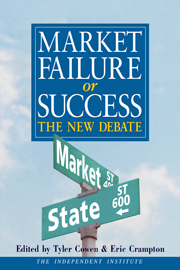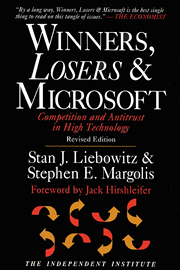In challenging the AOL-Time Warner merger, European Union Competition Commissioner Mario Monti cited the hoary notion that “network effects” create barriers to entry that allow a firm to “lock-in” its dominance. “More subscribers bring more content, and vice versa,” Mr. Monti argues. “The bigger the community of users, the less the reasons for a user to abandon AOL’s walled garden.” In short, because so many people like it, AOL now is, or soon will become, an insuperable monopoly.
This argument, coming back from the dead on both sides of the Atlantic, misapplies the reasonable concept of network effects and extends it to make an unreasonable claim of “lock-in.”
The idea of lock-in seems appealing. Suppose we all would rather use the brand X word processor than brand Y, but suppose that brand Y is widely used, making it simpler to share files among users. Economists call this “a network effect”—the number of other people using a product or service enhances its value. Although we’d gladly switch to brand X, no one is willing to switch for fear that everyone else will stick with brand Y. That’s the “lock-in effect.”
Some current writing, including the popular business book Information Rules, defines lock-in to include a different circumstance in which we use the best product, but where we might be less likely to switch because of network effects. That, however, would more appropriately be called stay-in, since being “forced” to use a product because it offers the highest quality at the lowest price is hardly a barrier that should concern regulators.
Even some entrepreneurs and venture capitalists have succumbed to the lock-in fairy tale. The rush to be first on the Web was brought about by visions of network effects that would supposedly lock in dominance. Amazon.com—one of Europe’s most popular Web sites—is a classic case. The online bookseller once argued that as the number of its users grew it would be a juggernaut. It hasn’t worked out that way. Amazon is still losing money. Part of the reason: there are no significant network effects for online sales. Network effects require that consumers derive value from others using the same network. But book buyers get little value from the fact that others shop where they do.
Besides, consumers are not myopic. If a better product is available, they will find out about it and know that others will too. They will often make the switch because of anticipated network effects. They will want to be where the market is heading, not where it was. And they will be encouraged to switch by advertising, discounting and other strategies that aggressive firms use to woo customers.
Which brings us back to the EU’s objections to the proposed tie-up of AOL and Time Warner. Network effects are largely nonexistent for the music and entertainment programming that AOL might sell. Consumers of entertainment content on AOL will not care how many others buy their products there. (If AOL relied on this strategy alone, it would probably lose money just like Amazon.) As for e-mail, there seems to be no network effect at all. Non-AOL users e-mail AOL users as easily as other AOL users do. Also, many sites in Europe and beyond offer free e-mail addresses. Even AOL’s famed Instant Messenger, a real improvement on e-mail, is now available free to non-AOL users.
European regulators seem to misunderstand network effects. Perhaps they confuse AOL with Napster, which has strong network effect because the number of songs available depends on the number of users. AOL will have the same library of music regardless of how many users go shopping there.
And, even if AOL were to enjoy real network effects, there is no “lock-in effect” created by them. Indeed every “lock-in” claim examined by economists (including us) has fallen apart on close inspection.
Take the famous lock-in case of VHS. Supposedly VHS prevailed over technically superior Beta because it was locked in by network effects. Not exactly. First, the two tape types are technically almost identical—one isn’t better than the other. VHS became dominant because it initially offered two hours per tape when Beta offered only one. Consumers mostly wanted to record movies and sports, which lasted longer than one hour. By the time beta got around to offering two-hour tapes, users and video stores were already happy with VHS and saw no advantage in switching back. Also, Beta was first. If lock-in mattered, we should have been stuck with Beta. We weren’t.
Regulators seem to regard network lock-in of software products as a foregone conclusion. But our detailed examination of numerous software markets reveals that better products quickly overtake incumbents, with market-share changes occurring rapidly. Network effects? Perhaps. But there is certainly no evidence of lock-in here.
Quicken, Word, Excel, Quark, and AOL achieved their successes by building better products, in each case overcoming an established incumbent (Managing Your Money, WordPerfect, Lotus 1-2-3, PageMaker, Prodigy). In all cases, the speed of the turnaround was remarkable.
Prodigy had a 60% share of the online service market in 1993. At a time that e-mailing did not cross from one Internet service provider to another, Prodigy’s position might have been thought to be walled in. But then Prodigy gave up its price advantage just as AOL was beginning to offer a more intuitive interface and better content. Two years later, Prodigy had shrunk, and AOL had grown, both reaching about 28% shares. After two more years, AOL had almost 60% of the market, and Prodigy’s share was under 10%. Better programming, better service and better content made the difference.
Lotus 1-2-3 had 70% of the spreadsheet market in late 1988; it was widely believed to be “locked in.” But, by 1991, Excel was winning in product comparison tests. By 1992, Lotus’s market share fell to just over 40%, a near-tie with Excel. By 1995, Excel had 80% of the market, Lotus had less than 20%. Consumers abandoned the seemingly dominant player as soon as a better alternative proved itself.
Similarly, WordPerfect was thought to have a lock on the word-processor market in 1990 with a 50% market share. But, by 1992, Microsoft Word was touted by reviewers as the best program. That earned Word a market share of 40% while WordPerfect slipped to 22%. Two years later, Word had a 60% share and WordPerfect has almost disappeared. Word’s rise makes sense. As reviewers and customers found Word to be increasingly useful and innovative, it’s sales grew apace.
Network effects have another implication that is not fully faced by antitrust authorities. If networks effects are important enough, then markets should gravitate toward monopoly. It would be inefficient to forbid consumers from taking advantage of network effects. In such circumstances, a regulatory obsession with market share will be more damaging than ever. The history of these high tech industries, except when supervised by regulators, is one of serial monopoly—one network winner being replaced by another. It is just a somewhat different form of competition.
Because AOL has been a peerless instigator of government intervention, it is tempting to cheer as it faces the network-theory guillotine that it helped erect. But that temptation should be avoided. There are probably few modern industries in which some network effect cannot be dreamed up and used to support a very restrictive, or perhaps we should say politically selective, merger policy. And we should find even more disturbing the trend toward basing public policy and legal argument on poorly understood academic developments that have themselves failed to meet the most basic of empirical tests.











